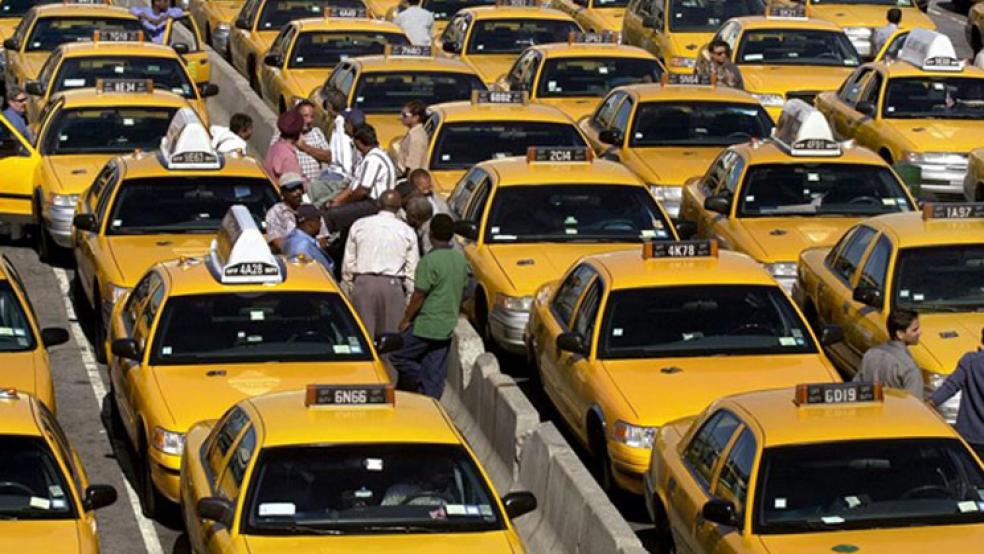“Meet Arro, the taxi industry’s best hope to survive increased competition from ridesharing companies such as Uber and Lyft.” This is a common headline praising the upcoming launch of the electronic taxi-hailing and payment service in major cities across the United States. Taxi drivers in New York City, San Francisco, Chicago, Boston, and Washington, D.C., will soon be able to breathe a sigh of relief, or so the story goes.
But contrary to popular belief, Arro is not a new innovation. Riders can already call a taxi through the Uber app in many cities. More important, Arro is no different from the taxi industry’s previous attempt to compete with ridesharing services—Hailo.
Hailo’s website states that the service “is available in more than 20 cities, including London, Madrid, Barcelona and Osaka, and all across Ireland.” Notably missing from its areas of operation are any U.S. cities. This is because in October 2014 Hailo ended its operations in the United States, citing an inability to compete with ridesharing companies. Better to move across the Atlantic where regulators, protestors, prosecutors, and courts are even more hostile to ridesharing.
Before Hailo’s exit from the United States, the company used Jimmy “the rent is too damn high” McMillion as its spokesman. As he cruised around a Hailo float on the streets of Washington, D.C., the previous candidate for mayor of New York City changed his trademark tagline to “the Uber rates are too damn high.”
Related: Uber for Doctors: 5 Apps Bring Back House Calls
The only problem with this advertising stunt was that Hailo had to pick up the tab for half of each taxi fare just to make prices in D.C. lower than those charged for a similar UberX ride. Keeping with the trend of taxi hypocrisy, this undercutting of prices is the type of behavior that leads taxi drivers to cry unfair competition when Uber or Lyft engages in it.
Undeterred, Arro has decided to copy Hailo’s business model and hope for different results. Though commentators have called Arro “the Uber of taxis,” this is misleading since the service does not offer most of the features that led to ridesharing’s impressive growth.
Arro’s website brags that it provides “always fair pricing,” which means “no surge pricing.” If this sounds familiar, it is. As Hailo stated when it was attempting to undercut Uber’s prices, “Lower prices and no surge anytime means affordability for everyone, not just the uber-wealthy.”
Never mind that there is nothing unfair about clearly-communicated prices. The inability of taxis to offer dynamic pricing means that the supply of taxi drivers will continue to fall well-below the demand for rides. This is why Uber’s surge and Lyft’s primetime are integral to the success of ridesharing, and why customers can almost always get a ride within 10 minutes.
Related: Ending the Uber Wars: How to Solve a Special Interest Nightmare
Arro, along with the now-defunct Hailo, operates within the broken taxi system. This antiquated industry has been insulated by government regulations from competition for so long that its customer service noticeably suffered.
The benefits of ridesharing extend far beyond friendly drivers, clean and quiet cars, and the ease of summoning rides with smartphones. Other benefits include flexibility and employment opportunitiesfor drivers, lower fares, more transportation options in previously-underserved neighborhoods, andincreased safety for both riders and drivers. Until taxis start competing on all of these fronts, they will continue to lose their declared war against ridesharing.
The low costs of partnering with a ridesharing company and a post-ride feedback system are not matched by Arro. Along with dynamic pricing, these innovations are the main reasons why ridesharing companies will continue to take rides from existing taxis and expand service to those who used to not take taxis.
Arro has the potential to improve slightly the experience of riding in taxis. The company’s electronic payment system means cabbies will no longer be able to claim that their credit card machines are broken (when they are not) in an attempt to make customers pay with the cash that they often do not have. This is progress, but adapting a technology that is years old does not warrant a celebration.
Arro’s launch is just one step of the many that are required to make taxis more similar to Ubers and Lyfts. A fancy app alone will not be enough to adjust the taxi status quo back to a focus on meeting customers’ needs. Policymakers need to relax caps on the number of government-approved taxis and restrictions on the prices that they can charge. Maybe then taxis will have a realistic chance to mount a challenge to ridesharing’s rapidly-increasing popularity.





